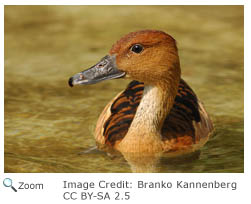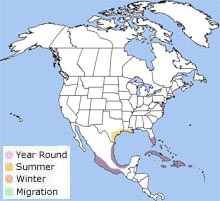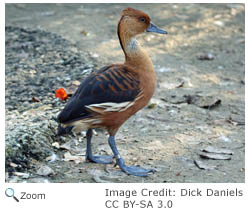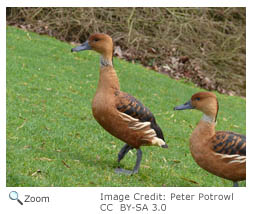Characteristics
 The fulvous whistling-duck was once called the fulvous tree duck. It is 18-21 inches in length. It has long, bluish gray legs and a long neck. It has cinnamon brown feathers and dark brown wings with a silvery-white stripe on the edges. It has a white rump and a blue-gray bill. Males and females look alike, although the males are a little larger. The fulvous whistling-duck was once called the fulvous tree duck. It is 18-21 inches in length. It has long, bluish gray legs and a long neck. It has cinnamon brown feathers and dark brown wings with a silvery-white stripe on the edges. It has a white rump and a blue-gray bill. Males and females look alike, although the males are a little larger.
Range
 The fulvous whistling-duck can be found from southern California to southwestern Arizona, and from central and eastern Texas and the Gulf Coast of Louisiana, south to Mexico and in southern Florida. It can also be found in Central and South America and Africa and Asia. The fulvous whistling-duck can be found from southern California to southwestern Arizona, and from central and eastern Texas and the Gulf Coast of Louisiana, south to Mexico and in southern Florida. It can also be found in Central and South America and Africa and Asia.
Habitat
The fulvous whistling-duck lives in marshlands, wet meadows, rice fields, flooded agricultural areas and lagoons.
|
|
Diet
 The fulvous whistling-duck usually eats at night. It gleans seeds from grasses and weeds and forages for waste grain in cornfields and rice fields. It will sometimes scoop up plant materials in shallow water. The fulvous whistling-duck usually eats at night. It gleans seeds from grasses and weeds and forages for waste grain in cornfields and rice fields. It will sometimes scoop up plant materials in shallow water.
Life Cycle
 The female lays 12-15 eggs in a nest made from grass or reeds. The nest is usually located a few inches above the water and is often built in a rice field. It may also be built at the edge of a pond or swamp, in a clump of bulrushes, or in a clump of cattails or other vegetation. Sometimes more than one duck will use the same nest. The ducklings hatch in 24 to 26 days and both parents will care for the young. The ducklings fledge in about 60 days. The female lays 12-15 eggs in a nest made from grass or reeds. The nest is usually located a few inches above the water and is often built in a rice field. It may also be built at the edge of a pond or swamp, in a clump of bulrushes, or in a clump of cattails or other vegetation. Sometimes more than one duck will use the same nest. The ducklings hatch in 24 to 26 days and both parents will care for the young. The ducklings fledge in about 60 days.
Behavior
The fulvous whistling-duck's name comes from the hoarse whistling sound it makes and from its coloring. Fulvous means tawny.
|